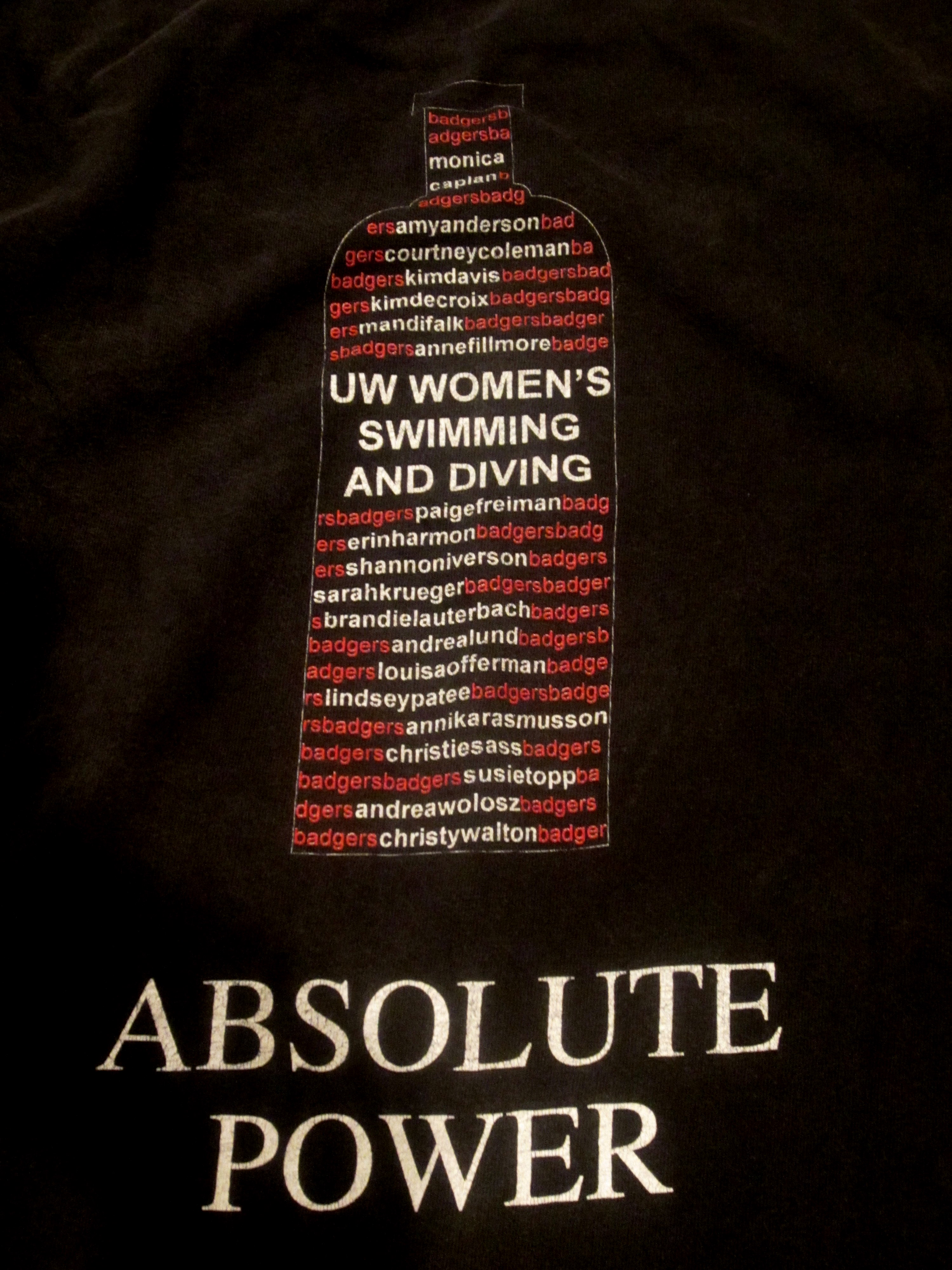“Power tends to corrupt, and absolute power corrupts absolutely.”
—John Emerich Edward Dalberg Acton
When I was a swimmer for the University of Wisconsin Women’s Swim Team, we had t-shirts printed one year for the Big Ten Championships that read “Absolute Power.” The back of the t-shirt featured an image – a bottle with our names jumbled together inside the bottle – that vaguely reminds me of the image above. The irony of the slogan is striking, however. Absolute Power? Sure, we had physical power (which is obviously what the message of the shirt was intended to convey), but absolute power had no place in our group – a group of women who thrived on teamwork, cooperation, encouragement, and support. Successful groups flourish with collaboration, responsibility and accountability, whereas absolute power survives by holding others down so that only one can rise above.
Absolute power can be counterbalanced by one thing, however: knowledge. Knowledge that comes from a well-rounded education that is supplemented with life experience can prevent power from becoming absolute. With knowledge, power is restrained, tempered by multiple and equally valid perspectives.
Knowledge comes from two main sources – education and life experience. While life experience is largely within our control (particularly as a person moves through childhood and becomes an adult), education in its most crucial years is largely not within our control. As children, our lives are subject to the lives and lifestyles of our parents, with access to a proper education determined (or limited), in large part, by our parents’ financial status.
Unfortunately, access to education has gone from a basic right to a commodity of which many are deprived in this country. In Brown v. Board of Education, the Supreme Court held that “[s]eparate educational facilities are inherently unequal,” yet we continue to offer disparate access to education and unequal quality of education based on economic class and financial status. Quite simply, those who can afford to live in wealthier school districts or pay private school tuition generally have access to a better education than those who do not have similar financial resources. adult), education in its most crucial years is largely not within our control. As children, our lives are subject to the lives and lifestyles of our parents, with access to a proper education determined (or limited), in large part, by our parents’ financial status.
But there is plenty that we can do. First, we can choose elected officials who actually care about improving the education system for all children, rather than just spouting worthless rhetoric and focusing their support on college-bound children who come from socioeconomic classes much like their own. We can write to our current elected officials and demand that they support educational improvements. We can express our profound support for and appreciation of teachers who are good at their job. We can donate funds and supplies to public schools in need through Adopt-A-Classroom and Donors Choose.
Education reform is a hot button issue lately and one that is not easily fixed, as made obvious by the popular 2010 documentary “Waiting for Superman.” Some are in favor of school voucher programs, others prefer charter schools, and still others choose to ignore the problem altogether. Our nation is more concerned lately with the reproductive and health decisions of women, than figuring out a way to improve our ailing education system. But without addressing the unequal access to education in our country, the problem will only get worse. Certainly a task as daunting as repairing our ailing education system can seem impossible and many just throw their hands up with an exasperated “What can I do?!?,” while resting safely in the knowledge their own children attend a “good” school. I must admit: I am often guilty of this myself.
Without equal access to a proper primary school education that falls across socioeconomic lines and benefits all children (not just our own children), knowledge will continue to filter into select communities and socioeconomic classes, thereby shrinking the counterbalancing force to absolute power. And as we all know, “absolute power corrupts absolutely” – even to those who hold it.
This is the second installment of the Photo Inspiration Challenge. Special thanks to Angie McMonigal Photography for her fabulous photos. Make sure to visit her website or facebook page.



4 Comments
Another great post. Thanks for the food for my brain today. 🙂
Pingback: Power and Ambition | Karoo Publishers
Very well written!
Pingback: Power and Ambition